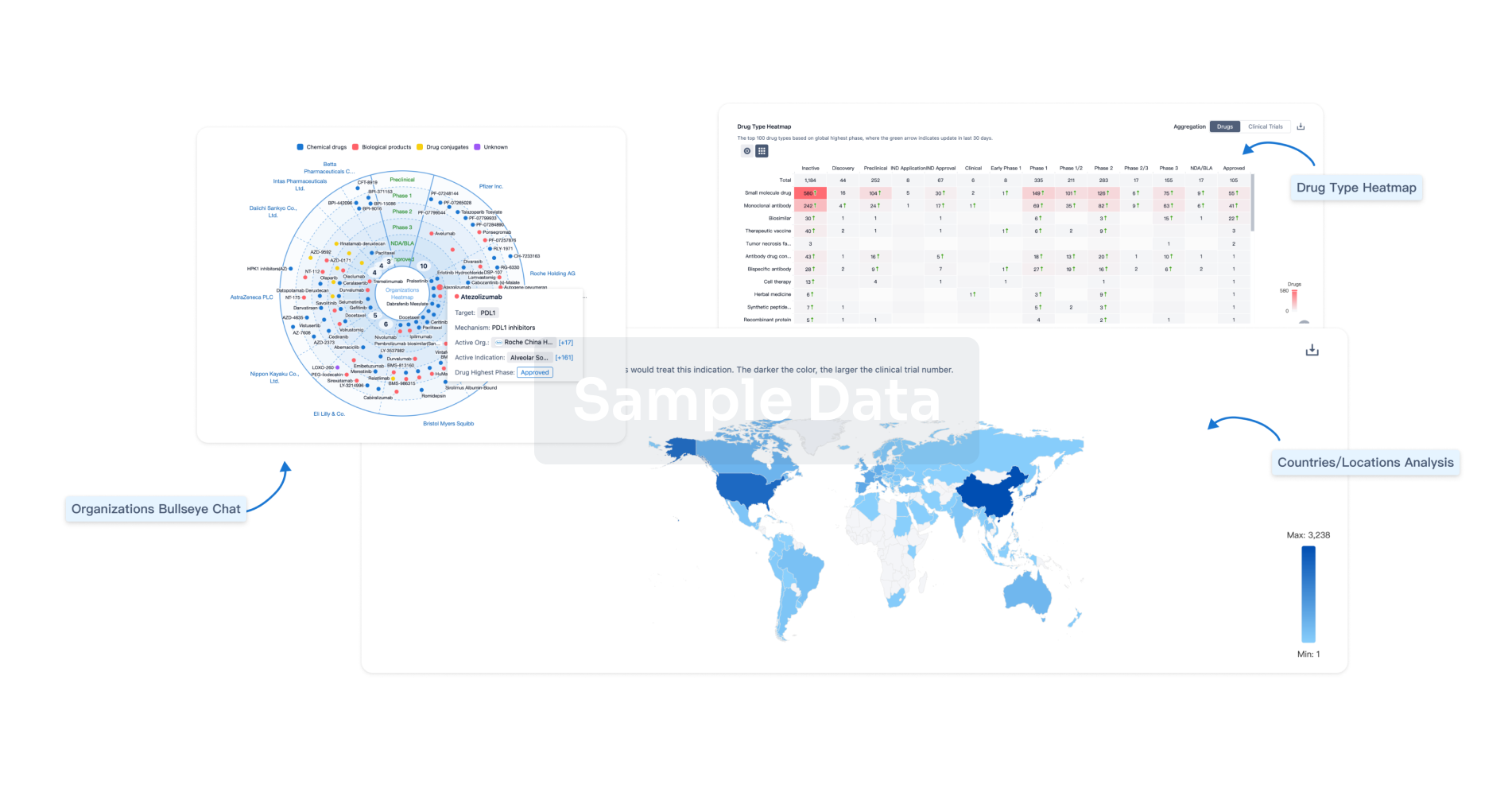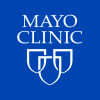Request Demo
Last update 08 May 2025
Pelvic Neoplasms
Last update 08 May 2025
Basic Info
Synonyms Cancer of Pelvis, Cancer of the Pelvis, Cancer, Pelvic + [56] |
Introduction Tumors or cancer of the pelvic region. |
Related
11
Drugs associated with Pelvic NeoplasmsTarget |
Mechanism VEGFR2 antagonists |
Active Org. |
Originator Org. |
Active Indication |
Inactive Indication |
Drug Highest PhaseApproved |
First Approval Ctry. / Loc. United States |
First Approval Date21 Apr 2014 |
Target |
Mechanism PDGFR antagonists [+2] |
Active Org. |
Originator Org. |
Active Indication |
Inactive Indication |
Drug Highest PhaseApproved |
First Approval Ctry. / Loc. United States |
First Approval Date26 Jan 2006 |
Target- |
Mechanism Photosensitizers |
Active Org. |
Originator Org. |
Active Indication |
Inactive Indication |
Drug Highest PhaseApproved |
First Approval Ctry. / Loc. Japan |
First Approval Date16 Oct 2003 |
145
Clinical Trials associated with Pelvic NeoplasmsNCT06915727
Pafolacianine for Localization of Pediatric Extracranial Solid Tumors
This phase III trial studies how well pafolacianine works for identifying cancerous lesions in children and adolescent patients with primary solid tumors or solid tumors that have spread from where they first started (primary site) to other places in the body (metastatic). Pafolacianine is a fluorescent imaging agent that targets folate receptors which are overexpressed in many cancers and is used with near infrared (NIR) imaging during surgery to identify tumor cells. NIR uses a special camera that uses wavelengths in the infrared range to visualize and locate the tumor cells that are lit up by the pafolacianine. Giving pafolacianine for NIR imaging may work better than other imaging agents in identifying cancerous lesions in pediatric patients with solid tumors.
Start Date15 Apr 2025 |
Sponsor / Collaborator |
NCT05648253
Pilot Study to Assess the Feasibility of Use of a Novel Vaginal Dilator Device Post-radiation for Patients With Pelvic Malignancies
Vaginal dilator therapy (VDT) with static dilators is often prescribed to patients following vaginal or pelvic radiation therapy. This study seeks to evaluate the feasibility of a novel intravaginal device that delivers patient-controlled dilation (Hyivy device). The study is designed as a proof-of-concept single-arm pilot study. The primary objective is to assess safety and tolerability, while also evaluating changes in health-related quality of life and pelvic pain.
Start Date11 Apr 2025 |
Sponsor / Collaborator  Hyivy Health, Inc. Hyivy Health, Inc. [+1] |
NCT06820320
Oral Iohexol in the Management of Chylous Ascites After Retroperitoneal or Extended Lymphadenectomy for Abdominal or Pelvic Malignant Tumor: an Innovative and Convenient Treatment
The goal of this clinical trial is to assess the effectiveness of oral iohexol in the treatment of postoperative chylous ascites. It will also learn about the safety of oral iohexol. The main questions it aims to answer are:
* Confirm the potential of oral iohexol as an innovative therapeutic regimen.
* Confirm its ability to improve clinical outcomes for patients.
* Confirm the potential of oral iohexol as an innovative therapeutic regimen.
* Confirm its ability to improve clinical outcomes for patients.
Start Date15 Feb 2025 |
Sponsor / Collaborator |
100 Clinical Results associated with Pelvic Neoplasms
Login to view more data
100 Translational Medicine associated with Pelvic Neoplasms
Login to view more data
0 Patents (Medical) associated with Pelvic Neoplasms
Login to view more data
4,824
Literatures (Medical) associated with Pelvic Neoplasms01 Aug 2025·European Journal of Surgical Oncology
The role of computer-assisted navigation in pelvic tumor surgery: A systematic review and meta-analysis
Review
Author: Za, Pierangelo ; Manfreda, Antongiulio ; Papalia, Giuseppe Francesco ; Zoccali, Carmine ; Parisi, Francesco Rosario ; Ferrini, Augusto ; Papalia, Rocco
01 May 2025·Journal of the American College of Surgeons
Outcomes of Palliative Hemipelvectomy in Comprehensive Cancer Center Patients with Metastatic Cancer: Retrospective Study
Article
Author: Curry, Michael ; Bartsch, Christan ; Gulati, Amitabh ; Omer, Dana ; Aysola, Varun ; Santos, Erin P ; Rosen, Roni ; Vaynrub, Max ; Nash, Garrett
01 May 2025·Thrombosis Research
The efficacy and safety of low-molecular-weight heparins for venous thromboembolism prophylaxis in abdominal or pelvic cancer surgery: A systematic review and network meta-analysis of randomized controlled trials
Article
Author: Liu, Kun ; Wu, Yi-Feng ; Zuo, Xiao-Cong ; Tang, Zhi-Yao ; Huang, Yu-Jie ; Hu, Can ; Zhou, Ling-Yun
15
News (Medical) associated with Pelvic Neoplasms01 May 2025
New data to be presented at the American Society of Breast Surgeons Annual Meeting shows fluid and body composition assessments improve early detection accuracy
CARLSBAD, Calif., May 1, 2025 /PRNewswire/ -- ImpediMed, a leader in medical technologies to clinically monitor and manage fluid and body composition, announced today that it will present new results from a breast cancer-related lymphedema (BCRL) study during a poster session at the American Society of Breast Surgeons (ASBrS) Annual Meeting in Las Vegas, NV on Friday, May 2nd at 6:00 p.m. in the Bellagio Grand Ballroom.
Titled "The Importance of a Pre-Treatment Baseline When Screening Patients for Breast Cancer–Related Lymphedema," the study underscores the need to measure fluid and body composition before cancer treatment begins. Findings from the PREVENT trial revealed that without a pre-treatment baseline, up to 71% of patients monitored with bioimpedance spectroscopy (BIS) and up to 88% of those monitored with tape measure would not have been identified as having early signs of lymphedema—potentially missing the window for early, more effective intervention.
ImpediMed Chief Medical Officer, Steven L. Chen, MD, MBA, the study's lead author, will present the findings at ASBrS.
"This evidence reinforces the critical importance of establishing an easy-to-perform, baseline measurement for fluid and body composition, one that improves the likelihood of detecting BCRL as early as possible so lymphedema treatment can begin at its most reversible stages," said Dr. Chen. "These findings highlight the importance of paying attention to lymphedema risk even as the cancer treatment is being planned."
The results stem from PREVENT, the largest randomized control trial to assess lymphedema prevention, in 1200 women, which monitored progression to chronic BCRL following intervention for early BCRL assessed by both BIS and a traditional tape measure. These baseline assessments performed prior to breast cancer treatment increased the likelihood that patients developing BCRL would be detected at an earlier stage post-treatment.
"Breast cancer-related lymphedema often stems from lymph node removal, radiation, or chemotherapy, and its impact goes far beyond discomfort—it can limit mobility and carry a significant financial burden," said study co-author John Boyages, MD, PhD, author of Lymphoedema –– Taking Control, a book he wrote after witnessing firsthand the physical and emotional trauma of lymphedema in many of his breast cancer survivor patients. "I firmly believe in the power of early detection and have used this technology since 2007. By identifying lymphedema before it's visible or measurable with a tape, it gives us a crucial window to intervene early and help prevent a lifelong, irreversible condition."
Lymphedema, a common consequence of cancer treatment, poses significant challenges in healthcare. According to the American Cancer Society 58% of cancer patients diagnosed with breast cancer, melanoma, or pelvic area cancers are at risk for developing limb lymphedema, and over 80% of breast cancer patients are at risk.
As a pioneer in the field of lymphedema detection and monitoring, ImpediMed offers the only FDA-cleared bioimpedance spectroscopy (BIS) solution for the clinical assessment of lymphedema –– SOZO® Digital Health Platform. ImpediMed's platform is now recommended in clinical practice guidelines nationwide and is broadly accepted and recognized for effective and accurate screening of lymphedema.
The National Comprehensive Cancer Network (NCCN) recently updated its Breast Cancer Clinical Practice Guidelines and advises on pretreatment screening as a baseline for patients with lymphedema risk factors, reinforcing the importance of baseline measurements to support early lymphedema detection.
"I'm proud to support research that highlights the benefits of closer monitoring for breast cancer survivors," said Scott Long, newly appointed Senior Vice President of Sales at ImpediMed. "It's rewarding to see survivorship care gaining momentum—something I've championed throughout my 30-year career in breast cancer biopsy and device development."
About SOZO Digital Health Platform
SOZO, the world's most advanced, non-invasive bioimpedance spectroscopy (BIS) device, delivers a precise snapshot of fluid status and tissue composition in less than 30 seconds. Using ImpediMed's BIS technology, SOZO measures 256 unique data points over a wide spectrum of frequencies from 3 kHz to 1000 kHz. Results are available immediately online for easy data access and sharing across an entire healthcare system. The FDA-cleared, CE-marked and ARTG-listed digital health platform aids in the early detection of secondary lymphedema, provides fluid status for patients living with heart or renal failure, and can be used to monitor and maintain overall health – all on a single device.
About ImpediMed
ImpediMed is a leading global medical technology company that designs and manufactures medical devices that employ bioimpedance spectroscopy (BIS) technology for use in the noninvasive clinical assessment and monitoring of fluid status and tissue composition in patients. The company consistently drives innovation, directing its primary efforts toward addressing the specific challenges and devastating burden of secondary lymphedema with a focus on breast cancer-related lymphedema (BCRL). With its SOZO® Digital Health Platform and L-Dex®, ImpediMed is the only company to offer an FDA-cleared technology that uses BIS and is setting new standards in early detection and management of BCRL. For more information, please visit .
About the PREVENT Trial
The PREVENT trial is a pivotal study and the largest randomized controlled trial to assess lymphedema prevention. The study enrolled 1,200 patients across 10 trial sites in the US and Australia, involving 13 hospitals, including Vanderbilt University, Mayo Clinic and MD Anderson. The trial was conducted over six and a half years and patients were followed for up to three years, with the primary aim to determine if early intervention in patients with subclinical detection of extracellular fluid accumulation via bioimpedance spectroscopy results in a lower rate of lymphedema progression versus the rate when tape measure is used for subclinical detection. The manuscript is published in Lymphatic Research and Biology.
The results of the trial demonstrated that patients with early detection with L-Dex™ technology and at-home intervention with compression garments resulted in a 7.9% rate of chronic lymphedema compared to a 19.2% rate of chronic lymphedema using tape measure. The difference is statistically significant (p=0.016) as well as being clinically significant for patients and clinicians. This represents an absolute reduction of 11.3% and a relative reduction of 59% in lymphedema progression at three years.
Media Contact:
Jodi Perkins
Amendola Communications, on behalf of ImpediMed
[email protected]
SOURCE ImpediMed
WANT YOUR COMPANY'S NEWS FEATURED ON PRNEWSWIRE.COM?
440k+
Newsrooms &
Influencers
9k+
Digital Media
Outlets
270k+
Journalists
Opted In
GET STARTED
Clinical StudyClinical Result
31 Oct 2024
ImpediMed's SOZO® Digital Health Platform Aligns with Updated Survivorship Standard, Marking a Milestone in Lymphedema Management
CARLSBAD, Calif., Oct. 31, 2024 /PRNewswire/ -- ImpediMed, a leader in medical technologies to clinically monitor and manage fluid and body composition, today announced the National Accreditation Program for Breast Centers (NABPC) has updated its 2024 accreditation standards and, for the first time, these standards include lymphedema prevention programs utilizing bioimpedance spectroscopy (BIS) as an evidence-based guideline for managing lymphedema. As a pioneer in the field of lymphedema detection and monitoring, ImpediMed offers the only FDA-cleared BIS technology for the clinical assessment of breast cancer-related lymphedema (BCRL) –– the SOZO® Digital Health Platform.
The NAPBC is a quality program of the American College of Surgeons, and the NAPBC-accredited programs must understand, implement, and demonstrate compliance with accreditation standards outlined in Optimal Resources for Breast Care. To maintain accreditation, centers must monitor their compliance with these standards and prepare for onsite review every three years. The 2024 Standards focus on the entire patient care journey from screening and prevention, to diagnosis, treatment, and survivorship, with an emphasis on providing value-based multidisciplinary care.
The updated NABPC Standard for Survivorship specifies that NABPC-accredited programs must use evidence-based guidelines to manage survivorship. Examples include, but are not limited to:1
Referral to outpatient rehabilitation for evaluation and treatment of lymphedema, as needed.
Use of a lymphedema prevention program, including regular symptom assessment and clinical evaluation using objective measurements, such as bioimpedance spectroscopy.
"As Breast Cancer Awareness month wraps up, it's especially noteworthy that the NABPC's accreditation standards now recognize BIS as a hallmark of top-tier lymphedema care," said Dr. Parmjot Bains, Managing Director and CEO of Impedimed. "This isn't just an acknowledgement of the impact of BIS technology—it's a beacon of hope for breast cancer survivors everywhere. By including BIS, the NABPC—whose standards are penned by leading U.S. breast cancer experts—is sending a powerful message. They're not just influencing clinicians and healthcare facilities; they're reshaping the landscape of patient care, pushing this innovative approach closer to becoming the gold standard in survivorship support."
Lymphedema, a disabling swelling that is a common consequence of cancer treatment, poses significant challenges in healthcare. According to the American Cancer Society, 58% of cancer patients diagnosed with breast cancer, melanoma, or pelvic area cancers are at risk for developing limb lymphedema. For breast cancer patients specifically, this risk can escalate depending on the type of treatment received. BIS is a groundbreaking technology that is revolutionizing lymphedema care that offers a noninvasive, quick, and highly sensitive method for detecting fluid changes in the body. By sending a small electrical current through the body and measuring the resistance, BIS can identify subclinical lymphedema long before visible symptoms appear – critical for preventing the progression to chronic lymphedema, enabling timely intervention and better outcomes.
ImpediMed's platform is broadly accepted and recognized for effective and accurate screening of lymphedema, with U.S. health insurers now providing coverage for over 146 million covered lives.
To access the full Optimal Resources for Breast Care (2024 Standards) visit the American College of Surgeons' website.
1Used with permission of the American College of Surgeons, Chicago, Illinois. The original source for this information is the American College of Surgeons. Content does not reflect the views or interpretations of the American College of Surgeons.
About ImpediMed
ImpediMed is a leading global medical technology company that designs and manufactures medical devices that employ bioimpedance spectroscopy (BIS) technology for use in the noninvasive clinical assessment and monitoring of fluid status and tissue composition in patients. The company consistently drives innovation, directing its primary efforts toward addressing the specific challenges and devastating burden of secondary lymphedema with a focus on breast cancer-related lymphedema (BCRL). With its SOZO® Digital Health Platform and L-Dex®, ImpediMed is the only company to offer an FDA-cleared technology that uses BIS and is setting new standards in early detection and management of BCRL. For more information, please visit .
About SOZO Digital Health Platform
SOZO, the world's most advanced, non-invasive bioimpedance spectroscopy (BIS) device, delivers a precise snapshot of fluid status and tissue composition in less than 30 seconds. Using ImpediMed's BIS technology, SOZO measures 256 unique data points over a wide spectrum of frequencies from 3 kHz to 1000 kHz. Results are available immediately online for easy data access and sharing across an entire healthcare system. The FDA-cleared, CE-marked and ARTG-listed digital health platform aids in the early detection of secondary lymphoedema, provides fluid status for patients living with heart or renal failure, and can be used to monitor and maintain overall health – all on a single device.
Media Contact:
Jodi Perkins
Amendola Communications, on behalf of ImpediMed
[email protected]
SOURCE ImpediMed
WANT YOUR COMPANY'S NEWS FEATURED ON PRNEWSWIRE.COM?
440k+
Newsrooms &
Influencers
9k+
Digital Media
Outlets
270k+
Journalists
Opted In
GET STARTED
13 Aug 2024
TUESDAY, Aug. 12, 2024 -- An experimental drug based on ancient Chinese herbal medicine can help ease the toxic
side effects
of chemotherapy and radiation therapy in cancer patients, the results of a small new trial results suggest.
A small group of 24 patients experienced fewer GI side effects from their treatment for rectal cancer after they took YIV-906, researchers reported recently in the
Journal of Gastrointestinal Oncology
.
YIV-906 is based on an 1,800-year-old treatment for stomach ailments that combined licorice, dates, peonies and skullcap, researchers said.
“This study is the first demonstration of YIV-906’s effectiveness in reducing GI toxicity caused by chemotherapy and radiation, showing the medicine’s potential of improving the patient’s quality of life while increasing treatment effectiveness,” said co-researcher
Yung-Chi Cheng
, a professor of pharmacology at Yale School of Medicine who helped develop the drug.
For the four-year, phase 2 study, the patients were given capsules of YIV-906 along with chemo and radiation prior to surgery.
At the time of surgery, about 17% of patients had a complete or near-complete response to their cancer treatment, while the overall survival rate at five years was 82%, results show.
Only two cases of severe diarrhea were reported among the patients. YIV-906 is meant to ease side effects like diarrhea, fatigue and nausea.
“We didn’t have any serious toxicity associated with the drug and patients found taking the drug in pill form very easy and tolerable,” senior researcher
Dr. Susan Higgins
, a professor of therapeutic radiology and of obstetrics, gynecology, and reproductive sciences at Yale.
The results warrant further testing of YIV-906 in more patients with other types of cancer, such as pelvic cancer, researchers said in a Yale new release.
People taking YIV-906 might be able to withstand harsher doses of both chemo and radiation therapy, making their cancer treatment more effective, the researchers added.
Whatever your topic of interest,
subscribe to our newsletters
to get the best of Drugs.com in your inbox.
Clinical ResultRadiation TherapyPhase 2
Analysis
Perform a panoramic analysis of this field.
login
or

AI Agents Built for Biopharma Breakthroughs
Accelerate discovery. Empower decisions. Transform outcomes.
Get started for free today!
Accelerate Strategic R&D decision making with Synapse, PatSnap’s AI-powered Connected Innovation Intelligence Platform Built for Life Sciences Professionals.
Start your data trial now!
Synapse data is also accessible to external entities via APIs or data packages. Empower better decisions with the latest in pharmaceutical intelligence.
Bio
Bio Sequences Search & Analysis
Sign up for free
Chemical
Chemical Structures Search & Analysis
Sign up for free





